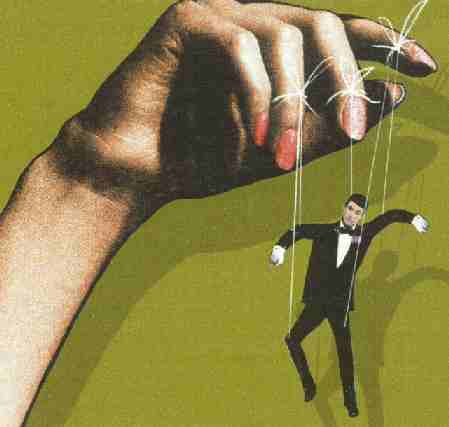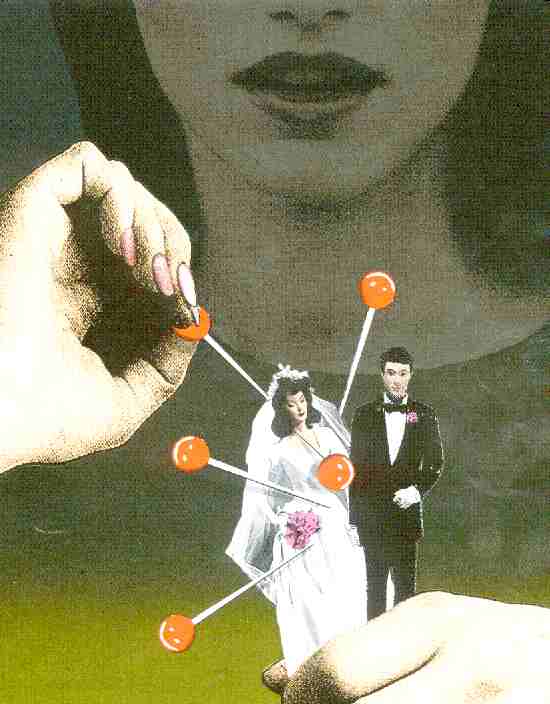Munchausen
syndrome is a psychiatric
disorder in which those affected feign disease, illness, or
psychological trauma in order to draw attention or sympathy to
themselves. It is in a class of disorders known as factitious
disorders which involve "illnesses" whose symptoms are
either self-induced or falsified by the patient. It is also
sometimes known as Hospital addiction syndrome.

Single
parent trap, step children
can
be wicked
puppet masters
Munchausen
syndrome
In
Munchausen syndrome, the affected person exaggerates or creates
symptoms of illnesses in themselves in order to gain
investigation, treatment, attention, sympathy, and comfort from
medical personnel. The role of "patient" is a familiar
and comforting one, and it fills a psychological need in people
with Munchausen's. It is distinct from hypochondria in that the
patient is aware that he is exaggerating, while sufferers of
hypochondria actually believe they have a disease.
There
is some controversy on the exact causes of the syndrome, but an
increased occurrence has been reported in healthcare professionals
and close family members of people with a chronic illness such as
manic depression.
Individuals
with the Munchausen pattern of behaviour may be admitted to many hospitals
under many medical teams.
Origin
of the name
The
name derives from one Baron Münchhausen (Karl Friedrich
Hieronymus Freiherr von Münchhausen, 1720-1797), to whom were
ascribed a series of fantastically impossible tales written by
Rudolf Raspe.
In
1951, Sir Richard Asher (father of Jane Asher and Peter Asher) was
the first to describe a pattern of self-harm, where individuals
fabricated histories, signs, and symptoms of illness. Remembering
Baron Munchausen, Asher named this condition Munchausen's
Syndrome. Originally, this term was used for all factitious
disorders. Now, however, there is considered to be a wide range of
factitious disorders, and the diagnosis of "Munchausen
syndrome" is reserved for the most severe form, where the
simulation of disease is the central activity of the affected
person's life.
Comparison
to Fabricated or Induced Illness (FII)
Fabricated
or Induced Illness (FII) is the formal name of a type of abuse in
which a caregiver feigns or induces an illness in a person under
their care, in order to attract attention, sympathy, or to fill
other emotional needs. It is informally known as Munchausen
Syndrome by Proxy (MSbP), due to its similarity to Munchausen
syndrome, in which a person feigns or induces illness in themselves
for similar emotional reasons. While a person can be said to be
"suffering" from Munchausen syndrome, it is incorrect to
state that a caretaking person who perpetrates abuse is
"suffering" from Munchausen Syndrome by Proxy.
The
two terms are frequently confused. One recognizable instance is in
a song by rap artist Eminem, titled "Cleaning Out My
Closet". The line from the song is:
-
"...
victim of Munchausen's syndrome/My whole life I was made to
believe I was sick when I wasn't"
The
circumstance Eminem describes is not the illness Munchausen
syndrome, but the type of abuse informally called Munchausen
Syndrome by Proxy.
Munchausen
Syndrome in popular culture
-
On
April 19, 1983, the NBC television series St. Elsewhere
aired the episode "Baron Von Munchausen" in which a
patient is eventually diagnosed with Munchausen syndrome.[1]
This 1983 reference was probably the first time that
Munchausen syndrome was referred to in an American network
dramatic series. In the 1990s and later, almost every major
medical drama on television has referred to either Munchausen
syndrome or Munchausen syndrome by proxy.
-
In
the film The Sixth Sense, the ghost of dead girl leads the
main character (played by Haley Joel Osment) to a video tape.
The tape reveals that her mother had been poisoning her with
cleaning fluid in her food (making her a victim of "Munchausen
by proxy"). This tape is played at the funeral gathering,
to the shocked horror of the girl's father. This action saves
the dead girl's sister from sharing the same fate (overheard
conversation at the funeral mentions that "now their
other daughter is sick").
-
First
airing October 11, 2005, an episode of FX's Nip/Tuck
features a patient with Munchausen syndrome. She cuts herself
to mimic the injuries left by the show's infamous face-slasher
The Carver (and later actually becomes one of his victims).
-
An
episode of ABC-TV's Grey's Anatomy first airing October
16, 2005, features a patient diagnosed with Munchausen
syndrome. She is portrayed taking Amitriptyline, an
antidepressant that turned her urine blue.
-
An
episode of FOX's House, M.D. first aired on December
13, 2005, featured a patient played by Cynthia Nixon who
admitted to Munchausen syndrome after being tricked into
taking Rifampin, an antibiotic that turned her tears orange,
but who was later additionally diagnosed with a bacterial
infection.
-
An
episode of NBC's Law & Order: Special Victims Unit
(S07E15), first aired on Tuesday February 7, 2006, featured a
woman, played by Rebecca
DeMornay, who had Munchausen syndrome.
-
In
an episode of the British series Doctors (TV series)
first aired on Wednesday 15th November 2006, a woman is
diagnosed with Munchausen syndrome after repeatedly faking
illness in the form of stomach pain. She cuts herself to put
blood in her urine, and has surgical scars on her stomach from
previous medical investigations. She then pretends to attempt
suicide when in actual fact she only took four tablets.
-
In
the Seinfeld episode The Scofflaw, a character played by Jon
Lovitz fakes cancer for the attention (and subsequently, gifts
such as a toupee).
LINKS
and REFERENCE
-
Feldman
M.D. 2004. Playing Sick? Untangling the Web of Munchausen
Syndrome, Munchausen by Proxy, Malingering, and Factitious
Disorder. New York: Brunner-Routledge.
-
Fisher,
Jill A. 2006. Playing Patient, Playing Doctor: Munchausen
Syndrome, Clinical S/M, and Ruptures of Medical Power. Journal
of Medical Humanities 27 (3): 135-149.
-
Fisher,
Jill A. 2006. Investigating the Barons: Narrative &
Nomenclature in Munchausen Syndrome. Perspectives in
Biology and Medicine 49 (2): 250-262.

Persecution
of stepfather or stepmother
by
children of single parent families
-
"Yucologia
hoc est de hominis perfectione, anima, ortu", published
in Marburg in 1590, was written by the German scholastic
philosopher Rudolf Goeckel (1547-1628), who often goes by the
Latinized Rudolph Goclenius.
-
Marko
Marulić (1450-1524) used the term "psychology"
in the title of his Latin treatise "Psichiologia de
ratione animae humanae." Although the treatise itself has
not been preserved, its title appears in a list of Marulic's
works compiled by his younger contemporary, Franjo
Bozicevic-Natalis in his "Vita Marci Maruli Spalatensis"
(Krstić, 1964).
-
http://www.rso.cornell.edu/scitech/archive/96fal/lang.html
-
Industrial
and Organization Psychology, Fourth Edition, John Wiley &
Sons, Inc., 2006.
-
http://nasponline.org/about_sp/whatis.aspx
-
Cohen,
J. (1994). The Earth is round, p < .05. American
Psychologist, 49,.
Further
reading
-
Chavis,
D.M., and Pretty, G. (1999). Sense of community: Advances in
measurement and application. Journal of Community
Psychology, 27(6), 635-642.
-
Sarason,
S.B. (1986). Commentary: The emergence of a conceptual center.
Journal of Community Psychology, 14, 405-407.
-
Spector,
Paul E. "Industrial Organization Psychology." 4th
Ed. Australia: John Wiley & Sons, Inc., 2006.
Learning
about Psychology
History
of Psychology
Other
-
PsychWiki
- Wiki for psychology researchers (theory, findings, research
methods, funding sources, and more)
-
Find
a Therapist - Psychology Today
-
AmoebaWeb
Psychology Directory
-
Wikia
has a wiki
about this topic: Psychology
-
Psychology
at the Open Directory Project
-
Dr.
Marc Feldman's Munchausen Syndrome, Malingering, Factitious
Disorder, & Munchausen by Proxy Page - Page offering
information on Munchausen and its many other names. Offers
information on Dr. Feldman's books and his email address for
interested parties.
-
Article
in Discover magazine, July 1993, by Abigail Zuger
-
Feldman
M.D. 2004. Playing Sick? Untangling the Web of Munchausen
Syndrome, Munchausen by Proxy, Malingering, and Factitious
Disorder. New York: Brunner-Routledge.
-
Fisher,
Jill A. 2006. Playing Patient, Playing Doctor: Munchausen
Syndrome, Clinical S/M, and Ruptures of Medical Power. Journal
of Medical Humanities 27 (3): 135-149.
-
Fisher,
Jill A. 2006. Investigating the Barons: Narrative &
Nomenclature in Munchausen Syndrome. Perspectives in
Biology and Medicine 49 (2): 250-262.
-
C.
C. Dike, "Pathological Lying Revisited," Journal of
the American Academy of Psychiatry and the Law 33, no. 3
(2005).
-
Article
on Pathological Liars
-
Article
Defining Compulsive/Pathological Lying
-
Online
book about pathological lying
-
Joe
Edwards
-
Ken
Jones
-
Paul
Whitehouse
-
Sarah
Jane Gallagher
-
Sir
Ken Macdonald QC
FALSE
ACCUSATIONS
Very
many persons accused of assault, especially sexual assault, are
either innocent or having been found guilty by a Court, are later
found to have been innocent all along.
Under
current legislation the accuser's identity is protected, whereas
the accused is not. Where the majority of persons accused
turn out to be innocent, during the period they are under
suspicion, they are reported in the press, with an assumption of
guilt, which usually ruins their lives: relationships and
businesses. This particularly applies to Carers or Teachers, or
those involved in such professions.
The
man in the street is particularly vulnerable when entering into a
relationship, since he or she has no body to turn to for advice
and is not in any event tuned into the potential dangers. Those
most at risk include males joining single parent families with
children, and most especially young girls who are most likely to
hurl accusations and usually where a relationship is not working
or is breaking down.
F.A.C.T.
(Falsely Accused Carers and Teachers)
PO Box 3074
Cardiff CF3 3WZ
Tel: 029 2077 7499
E-mail: info@factuk.org
Website: www.factuk.org
Campaigning organisation and support group which provides help and
advice to falsely accused and wrongly convicted carers and
teachers throughout the UK. The website contains a range of
information, leaflets, books and links.
Guidance
for education staff and volunteers in schools
Website: www.lg-employers.gov.uk/conditions/education/allegations
This website has guidance on: 1) staff facing an allegation of
abuse; 2) preventing 'abuse of trust' for education staff; and 3)
the conduct of education staff working with young people.
SOME
PROMINENT MISCARRIAGES OF JUSTICE:
Simon
Hall
David
Watkins
Katie
Davis
Leon
Benjamin Forde
Warren
Blackwell
Darryl
Gee
Disclaimer
Some of the views expressed on this website are those of
individual contributors and do not necessarily represent the
views of SN. All content is for general information only and is
not intended to replace professional advice of any kind. SN is
not responsible or liable for any actions taken by a user of
this site. SN is not liable for the contents of any external
sites listed, nor does it endorse any advice, products or
services mentioned on these sites.
HUMANS:
|
SIMPLE
LIFE FORMS
|
As
in Amoeba, plankton (phyla: protozoa) |
|
ECHINODERMS |
As
in Starfish (phyla: Echinodermata) |
|
ANNELIDS |
As
in Earthworms (phyla: Annelida) |
|
MOLLUSKS |
Such
as octopus (phyla: Mollusca) |
|
ARTHROPODS |
Crabs,
spiders, insects (phyla: Arthropoda) |
|
CRUSTACEANS |
such
as crabs (subphyla: Crustacea) |
|
ARACHNIDS |
Spiders
(class: Arachnida) |
|
INSECTS |
Ants
(subphyla: Uniramia class:
Insecta) |
|
FISH
|
Sharks,
Tuna (group: Pisces) |
|
AMPHIBIANS |
Such
as frogs (class: Amphibia) |
|
REPTILES
|
As
in Crocodiles, Snakes (class: Reptilia) |
|
BIRDS
|
Such
as Eagles, Crow (class: Aves) |
|
DINOSAURS
|
Tyranosaurus
Rex, Brontosaurus (Extinct) |
|
MAMMALS
|
Warm
blooded animals (class: Mammalia) |
|
MARSUPIALS |
Such
as Kangaroos (order: Marsupialia) |
|
PRIMATES |
Gorillas,
Chimpanzees
(order: Primates) |
|
RODENTS |
such
as Rats, Mice (order: Rodentia) |
|
CETACEANS
|
such
as Whales
& Dolphins
( order:Cetacea) |
|
ANTHROPOLOGY |
Neanderthals,
Homo Erectus (Extinct) |
|
HUMANS
- MAN |
Homo
Sapiens THE
BRAIN |
|
LIFE
ON EARTH
|
Which
includes PLANTS
non- animal life |
|
|
A
taste for adventure capitalists

Solar
Cola - the healthier cola alternative
|

